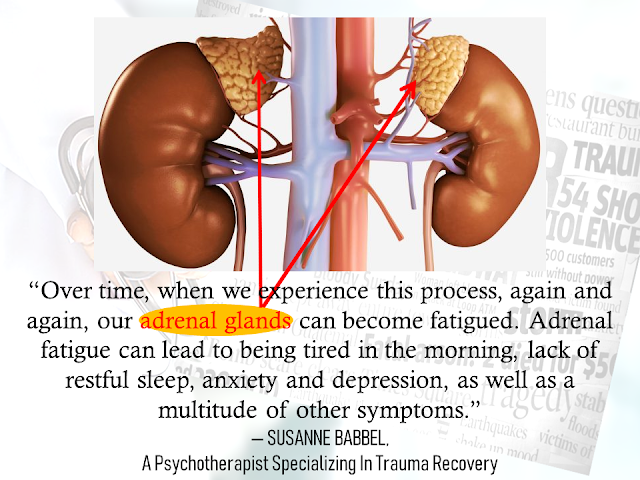This article is filed under: Health Current Events, Health, Article About Health, Health Issues, Health Problems
With the fast pace development of technology, social media, and news cycle which is available round-the-clock, exposure to traumatic events has rapidly increased over the past few years, as well. A survey conducted in 2015 reveals that 65% of adults now are social networking sites users. The most public news is now readily available on many digital platforms.
From the worries of life like how to get away with your debts, where to get money to pay your bills rent and mortgages, it has always been a world full of stress, but experiencing acute events occurring thousands of miles away is a new and challenging phenomenon. It could make you feel like the world is falling apart. All by watching and listening to the bad news happening around the world. Can too much bad news really affect our health?
Advertisement
Sponsored Links
Our brains are designed to process stress relating to trauma by entering what is known as "fight, flight, freeze" mode before returning to a restful state, explained Susanne Babbel, a psychotherapist specializing in trauma recovery. However, constant exposure to trauma can derail our ability to cope healthily and hinder our ability to return to a relaxed state.
After the perceived threat is resolved, the body's resting state of homeostasis should be regained. However, repetitive exposure to traumatic events means the body is going through this process more frequently than it should normally do, making the supposed to be restful recovery interrupted.
Studies about the effects of stress on the brain and body said that acute stress responses in young, healthy individuals may be adaptive and typically do not impose a health risk. However, if the threat is unremitting, particularly in older or unhealthy individuals, the long-term effects of stress could damage health.
Chronic stress levels can have myriad physical manifestations such as headaches, muscle tension or pain, stomach problems, anxiety and sleep problems.
Flooding of news and trauma can also lead to what is known as disaster fatigue, making us less concerned and more apathetic and feeling a diminished sense of urgency about the crisis at hand. It occurs when prolonged exposure to news coverage of disasters causes potential donors or volunteers to lose motivation to address the problem.
Babbel said that in order to prevent your self from the effects of bad news overload, everyone has to know their limits.
This can be done by turning off push notifications on your social media to relieve yourself on stress causing news and articles.
This can help you relax and soothe your nerves from the bad news that causes stress.You can also use stress management techniques such as exercise, spending time with friends and family, and relaxation techniques such as meditation, deep breathing, and yoga.
Using any of the muscles in your face or vocal cords, such as deep breathing, humming or singing, will help calm your nervous system. "That's why soldiers often sing when they are going to war, to cope with the stress," Babbel said.
Cultivating resilience together
As climate change heightens the frequency and intensity of natural disasters, preparing and recovering from the crisis will become even more important. Traumatic events can dismantle the mental and social frameworks that support a healthy mind.
Even after the floodwaters recede, the wildfire is put out or the rubble is cleared, many individuals face heightened threats to their mental health.
"Across the board, one of the major mental health threats to well-being is feeling unmoored," said Christie Manning, assistant professor of environmental studies and psychology at Macalester College.
"Think about the people who had their homes and lives destroyed by Harvey or Irma or the wildfires in California. People lose everything. Their lives become disconnected from their past and their community. They are now scattered," Manning said.
The research points to a social connection as the bedrock of resilience and the best way to combat apathy.
"The more that you are connected to others and you can call upon them, the more likely it is that your entire community will withstand," Manning said.
The way forward is to learn effective ways to engage with reality without being consumed by it, explained Terry Osborne, a professor at Dartmouth College who studies the relationship of humans and nature. "The challenge is carrying the pain but not letting it bury you."
Self-care can seem indulgent, even selfish, in the face of destruction. Personal problems can feel minuscule relative to the grave suffering and pressing global issues around the globe. But in crisis, self-care is one of the most selfless actions. Practicing the ability to self-soothe and improve our nervous system's response to stress will buffer the negative impacts of crisis and help us help others.
Practicing self-soothing techniques is like building muscle; it will make us stronger and more resilient to crises. And as the legendary Mr. Rogers said, in times of disaster, "Look for the helpers." Contrary to what many may expect, the direst situations can lead people to be their best selves, serving others and coming together across difference.
Looking for the helpers, learning to soothe your fight-flight-freeze response and building social connections will help you stay afloat when you feel like you are drowning in bad news.
We might not be able to predict the future, but we can prepare for it using these strategies -- a future that might be filled with catastrophe but that is hopefully brighter and more beautiful than the present.
This article is filed under: Health Current Events, Health, Article About Health, Health Issues, Health Problems
This article is filed under: Health Current Events, Health, Article About Health, Health Issues, Health Problems



